- Home
- Salman Rushdie
Midnight's Children Page 14
Midnight's Children Read online
Page 14
And where are they now, the first inhabitants? Coconuts have done best of all. Coconuts are still beheaded daily on Chowpatty Beach; while on Juhu Beach, under the languid gaze of film stars at the Sun ‘n’ Sand hotel, small boys still shin up coconut palms and bring down the bearded fruit. Coconuts even have their own festival, Coconut Day, which was celebrated a few days before my synchronistic birth. You may feel reassured about coconuts. Rice has not been so lucky; rice-paddies lie under concrete now; tenements tower where once rice wallowed within sight of the sea. But still, in the city, we are great rice-eaters. Patna rice, Basmati, Kashmiri rice travels to the metropolis daily; so the original, ur-rice has left its mark upon us all, and cannot be said to have died in vain. As for Mumbadevi—she’s not so popular these days, having been replaced by elephant-headed Ganesh in the people’s affections. The calendar of festivals reveals her decline: Ganesh—“Ganpati Baba”—has his day of Ganesh Chaturthi, when huge processions are “taken out” and march to Chowpatty bearing plaster effigies of the god, which they hurl into the sea. Ganesh’s day is a rain-making ceremony, it makes the monsoon possible, and it, too, was celebrated in the days before my arrival at the end of the ticktock countdown—but where is Mumbadevi’s day? It is not on the calendar. Where the prayers of pomfret folk, the devotions of crab-catchers? … Of all the first inhabitants, the Koli fishermen have come off worst of all. Squashed now into a tiny village in the thumb of the hand-like peninsula, they have admittedly given their name to a district—Colaba. But follow Colaba Causeway to its tip—past cheap clothes shops and Irani restaurants and the second-rate flats of teachers, journalists and clerks—and you’ll find them, trapped between the naval base and the sea. And sometimes Koli women, their hands stinking of pomfret guts and crabmeat, jostle arrogantly to the head of a Colaba bus-queue, with their crimson (or purple) saris hitched brazenly up between their legs, and a smarting glint of old defeats and dispossessions in their bulging and somewhat fishy eyes. A fort, and afterwards a city, took their land; pile-drivers stole (tetrapods would steal) pieces of their sea. But there are still Arab dhows, every evening, spreading their sails against the sunset … in August 1947, the British, having ended the dominion of fishing-nets, coconuts, rice and Mumbadevi, were about to depart themselves; no dominion is everlasting.
And on June 19th, two weeks after their arrival by Frontier Mail, my parents entered into a curious bargain with one such departing Englishman. His name was William Methwold.
The road to Methwold’s Estate (we are entering my kingdom now, coming into the heart of my childhood; a little lump has appeared in my throat) turns off Warden Road between a bus-stop and a little row of shops. Chimalker’s Toyshop; Reader’s Paradise; the Chimanbhoy Fatbhoy jewelery store; and, above all, Bombelli’s the Confectioners, with their Marquis cake, their One Yard of Chocolates! Names to conjure with; but there’s no time now. Past the saluting cardboard bellboy of the Band Box Laundry, the road leads us home. In those days the pink skyscraper of the Narlikar women (hideous echo of Srinagar’s radio mast!) had not even been thought of; the road mounted a low hillock, no higher than a two-storey building; it curved round to face the sea, to look down on Breach Candy Swimming Club, where pink people could swim in a pool the shape of British India without fear of rubbing up against a black skin; and there, arranged nobly around a little roundabout, were the palaces of William Methwold, on which hung signs that would—thanks to me—reappear many years later, signs bearing two words; just two, but they lured my unwitting parents into Methwold’s peculiar game: FOR SALE.
Methwold’s Estate: four identical houses built in a style befitting their original residents (conquerors’ houses! Roman mansions; three-storey homes of gods standing on a two-storey Olympus, a stunted Kailasa!)—large, durable mansions with red gabled roofs and turret towers in each corner, ivory-white corner towers wearing pointy red-tiled hats (towers fit to lock princesses in!)—houses with verandahs, with servants’ quarters reached by spiral iron staircases hidden at the back—houses which their owner, William Methwold, had named majestically after the palaces of Europe: Versailles Villa, Buckingham Villa, Escorial Villa and Sans Souci. Bougainvillaea crept across them; goldfish swam in pale blue pools; cacti grew in rock-gardens; tiny touch-me-not plants huddled beneath tamarind trees; there were butterflies and roses and cane chairs on the lawns. And on that day in the middle of June, Mr. Methwold sold his empty palaces for ridiculously little—but there were conditions. So now, without more ado, I present him to you, complete with the center-parting in his hair … a six-foot Titan, this Methwold, his face the pink of roses and eternal youth. He had a head of thick black brilliantined hair, parted in the center. We shall speak again of this center-parting, whose ramrod precision made Methwold irresistible to women, who felt unable to prevent themselves wanting to rumple it up … Methwold’s hair, parted in the middle, has a lot to do with my beginnings. It was one of those hairlines along which history and sexuality moved. Like tightrope-walkers. (But despite everything, not even I, who never saw him, never laid eyes on languid gleaming teeth or devastatingly combed hair, am capable of bearing him any grudge.)
And his nose? What did that look like? Prominent? Yes, it must have been, the legacy of a patrician French grandmother—from Bergerac!—whose blood ran aquamarinely in his veins and darkened his courtly charm with something crueller, some sweet murderous shade of absinthe.
Methwold’s Estate was sold on two conditions: that the houses be bought complete with every last thing in them, that the entire contents be retained by the new owners; and that the actual transfer should not take place until midnight on August 15th.
“Everything?” Amina Sinai asked. “I can’t even throw away a spoon? Allah, that lampshade … I can’t get rid of one comb?”
“Lock, stock and barrel,” Methwold said, “Those are my terms. A whim, Mr. Sinai … you’ll permit a departing colonial his little game? We don’t have much left to do, we British, except to play our games.”
“Listen now, listen, Amina,” Ahmed is saying later on, “You want to stay in this hotel room for ever? It’s a fantastic price; fantastic, absolutely. And what can he do after he’s transferred the deeds? Then you can throw out any lampshade you like. It’s less than two months …”
“You’ll take a cocktail in the garden?” Methwold is saying, “Six o’clock every evening. Cocktail hour. Never varied in twenty years.”
“But my God, the paint … and the cupboards are full of old clothes, janum … we’ll have to live out of suitcases, there’s nowhere to put one suit!”
“Bad business, Mr. Sinai,” Methwold sips his Scotch amid cacti and roses, “Never seen the like. Hundreds of years of decent government, then suddenly, up and off. You’ll admit we weren’t all bad: built your roads. Schools, railway trains, parliamentary system, all worthwhile things. Taj Mahal was falling down until an Englishman bothered to see to it. And now, suddenly, independence. Seventy days to get out. I’m dead against it myself, but what’s to be done?”
“… And look at the stains on the carpets, janum; for two months we must live like those Britishers? You’ve looked in the bathrooms? No water near the pot. I never believed, but it’s true, my God, they wipe their bottoms with paper only! …”
“Tell me, Mr. Methwold,” Ahmed Sinai’s voice has changed, in the presence of an Englishman it has become a hideous mockery of an Oxford drawl, “why insist on the delay? Quick sale is best business, after all. Get the thing buttoned up.”
“… And pictures of old Englishwomen everywhere, baba! No place to hang my own father’s photo on the wall! …”
“It seems, Mr. Sinai,” Mr. Methwold is refilling the glasses as the sun dives towards the Arabian Sea behind the Breach Candy pool, “that beneath this stiff English exterior lurks a mind with a very Indian lust for allegory.”
“And drinking so much, janum … that’s not good.”
“I’m not sure—Mr. Methwold, ah—what exactly you mean by …”
<
br /> “… Oh, you know: after a fashion, I’m transferring power, too. Got a sort of itch to do it at the same time the Raj does. As I said: a game. Humor me, won’t you, Sinai? After all: the price, you’ve admitted, isn’t bad.”
“Has his brain gone raw, janum? What do you think: is it safe to do bargains if he’s loony?”
“Now listen, wife,” Ahmed Sinai is saying, “this has gone on long enough. Mr. Methwold is a fine man; a person of breeding; a man of honor; I will not have his name … And besides, the other purchasers aren’t making so much noise, I’m sure … Anyway, I have told him yes, so there’s an end to it.”
“Have a cracker,” Mr. Methwold is saying, proffering a plate, “Go on, Mr. S., do. Yes, a curious affair. Never seen anything like it. My old tenants—old India hands, the lot—suddenly, up and off. Bad show. Lost their stomachs for India. Overnight. Puzzling to a simple fellow like me. Seemed like they washed their hands—didn’t want to take a scrap with them. ‘Let it go,’ they said. Fresh start back home. Not short of a shilling, none of them, you understand, but still. Rum. Leaving me holding the baby. Then I had my notion.”
“… Yes, decide, decide,” Amina is saying spiritedly, “I am sitting here like a lump with a baby, what have I to do with it? I must live in a stranger’s house with this child growing, so what? … Oh, what things you make me do …”
“Don’t cry,” Ahmed is saying now, flapping about the hotel room, “It’s a good house. You know you like the house. And two months … less than two … what, is it kicking? Let me feel … Where? Here?”
“There,” Amina says, wiping her nose, “Such a good big kick.”
“My notion,” Mr. Methwold explains, staring at the setting sun, “is to stage my own transfer of assets. Leave behind everything you see? Select suitable persons—such as yourself, Mr. Sinai!—hand everything over absolutely intact: in tiptop working order. Look around you: everything’s in fine fettle, don’t you agree? Tickety-boo, we used to say. Or, as you say in Hindustani: Sabkuch ticktock hai. Everything’s just fine.”
“Nice people are buying the houses,” Ahmed offers Amina his handkerchief, “nice new neighbours … that Mr. Homi Catrack in Versailles Villa, Parsee chap, but a racehorse-owner. Produces films and all. And the Ibrahims in Sans Souci, Nussie Ibrahim is having a baby, too, you can be friends … and the old man Ibrahim, with so-big sisal farms in Africa. Good family.”
“… And afterwards I can do what I like with the house … ?”
“Yes, afterwards, naturally, he’ll be gone …”
“… It’s all worked out excellently,” William Methwold says. “Did you know my ancestor was the chap who had the idea of building this whole city? Sort of Raffles of Bombay. As his descendant, at this important juncture, I feel the, I don’t know, need to play my part. Yes, excellently … when d’you move in? Say the word and I’ll move off to the Taj Hotel. Tomorrow? Excellent. Sabkuch ticktock hai.”
These were the people amongst whom I spent my childhood: Mr. Homi Catrack, film magnate and racehorse-owner, with his idiot daughter Toxy who had to be locked up with her nurse, Bi-Appah, the most fearsome woman I ever knew; also the Ibrahims in Sans Souci, old man Ibrahim Ibrahim with his goatee and sisal, his sons Ismail and Ishaq, and Ismail’s tiny flustery hapless wife Nussie, whom we always called Nussie-the-duck on account of her waddling gait, and in whose womb my friend Sonny was growing, even now, getting closer and closer to his misadventure with a pair of gynecological forceps … Escorial Villa was divided into flats. On the ground floor lived the Dubashes, he a physicist who would become a leading light at the Trombay nuclear research base, she a cipher beneath whose blankness a true religious fanaticism lay concealed—but I’ll let it lie, mentioning only that they were the parents of Cyrus (who would not be conceived for a few months yet), my first mentor, who played girls’ parts in school plays and was known as Cyrus-the-great. Above them was my father’s friend Doctor Narlikar, who had bought a flat here too … he was as black as my mother; had the ability of glowing brightly whenever he became excited or aroused; hated children, even though he brought us into the world; and would unleash upon the city, when he died, that tribe of women who could do anything and in whose path no obstacle could stand. And, finally on the top floor, were Commander Sabarmati and Lila—Sabarmati who was one of the highest flyers in the Navy, and his wife with her expensive tastes; he hadn’t been able to believe his luck in getting her a home so cheaply. They had two sons, aged eighteen months and four months, who would grow up to be slow and boisterous and to be nicknamed Eyeslice and Hairoil; and they didn’t know (how could they?) that I would destroy their lives … Selected by William Methwold, these people who would form the center of my world moved into the Estate and tolerated the curious whims of the Englishman—because the price, after all, was right.
… There are thirty days to go to the transfer of power and Lila Sabarmati is on the telephone, “How can you stand it, Nussie? In every room here there are talking budgies, and in the almirahs I find moth-eaten dresses and used brassières!” … And Nussie is telling Amina, “Goldfish, Allah, I can’t stand the creatures, but Methwold Sahib comes himself to feed … and there are half-empty pots of Bovril he says I can’t throw … it’s mad, Amina sister, what are we doing like this?” … And old man Ibrahim is refusing to switch on the ceiling-fan in his bedroom, muttering. “That machine will fall—it will slice my head off in the night—how long can something so heavy stick on a ceiling?” … and Homi Catrack who is something of an ascetic is obliged to lie on a large soft mattress, he is suffering from backache and sleeplessness and the dark rings of inbreeding around his eyes are being circled by the whorls of insomnia, and his bearer tells him, “No wonder the foreign sahibs have all gone away, sahib, they must be dying to get some sleep.” But they are all sticking it out; and there are advantages as well as problems. Listen to Lila Sabarmati (“That one—too beautiful to be good,” my mother said) … “A pianola, Amina sister! And it works! All day I’m sitting sitting, playing God knows what-all! Pale Hands I Loved Beside The Shalimar’ … such fun, too much, you just push the pedals!” … And Ahmed Sinai finds a cocktail cabinet in Buckingham Villa (which was Methwold’s own house before it was ours); he is discovering the delights of fine Scotch whiskey and cries, “So what? Mr. Methwold is a little eccentric, that’s all—can we not humor him? With our ancient civilization, can we not be as civilized as he?” … and he drains his glass at one go. Advantages and disadvantages: ‘All these dogs to look after, Nussie sister,” Lila Sabarmati complains. “I hate dogs, completely. And my little choochie cat, cho chweet she is I swear, terrified absolutely!” … And Doctor Narlikar, glowing with pique, “Above my bed! Pictures of children, Sinai brother! I am telling you: fat! Pink! Three! Is that fair?” … But now there are twenty days to go, things are settling down, the sharp edges of things are getting blurred, so they have all failed to notice what is happening: the Estate, Methwold’s Estate, is changing them. Every evening at six they are out in their gardens, celebrating the cocktail hour, and when William Methwold comes to call they slip effortlessly into their imitation Oxford drawls; and they are learning, about ceiling-fans and gas cookers and the correct diet for budgerigars, and Methwold, supervising their transformation, is mumbling under his breath. Listen carefully: what’s he saying? Yes, that’s it. “Sabkuch ticktock hai,” mumbles William Methwold. All is well.
When the Bombay edition of the Times of India, searching for a catchy human-interest angle to the forthcoming Independence celebrations, announced that it would award a prize to any Bombay mother who could arrange to give birth to a child at the precise instant of the birth of the new nation, Amina Sinai, who had just awoken from a mysterious dream of flypaper, became glued to newsprint. Newsprint was thrust beneath Ahmed Sinai’s nose; and Amina’s finger, jabbing triumphantly at the page, punctuated the utter certainty of her voice.
“See, janum?” Amina announced. “That’s going to be me.”
&nb
sp; There rose, before their eyes, a vision of bold headlines declaring “A Charming Pose of Baby Sinai—the Child of this Glorious Hour!”—a vision of A-l top-quality front-page jumbo-sized baby-snaps; but Ahmed began to argue, “Think of the odds against it, Begum,” until she set her mouth into a clamp of obstinacy and reiterated, “But me no buts; it’s me all right; I just know it for sure. Don’t ask me how.”
And although Ahmed repeated his wife’s prophecy to William Methwold, as a cocktail-hour joke, Amina remained unshaken, even when Methwold laughed. “Woman’s intuition—splendid thing, Mrs. S.! But really, you can scarcely expect us to …” Even under the pressure of the peeved gaze of her neighbor Nussie-the-duck, who was also pregnant, and had also read the Times of India, Amina stuck to her guns, because Ramram’s prediction had sunk deep into her heart.
To tell the truth, as Amina’s pregnancy progressed, she had found the words of the fortune-teller pressing more and more heavily down upon her shoulders, her head, her swelling balloon, so that as she became trapped in a web of worries about giving birth to a child with two heads she somehow escaped the subtle magic of Methwold’s Estate, remaining uninfected by cocktail-hours, budgerigars, pianolas and English accents … At first, then, there was something equivocal about her certainty that she could win the Times’s prize, because she had convinced herself that if this part of the fortune-teller’s prognostications were fulfilled, it proved that the rest would be just as accurate, whatever their meaning might be. So it was not in tones of unadulterated pride and anticipation that my mother said, “Never mind intuition, Mr. Methwold. This is guaranteed fact.”
To herself she added: “And this, too: I’m going to have a son. But he’ll need plenty of looking after, or else.”

 Shame
Shame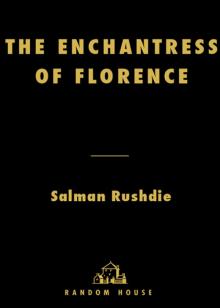 The Enchantress of Florence
The Enchantress of Florence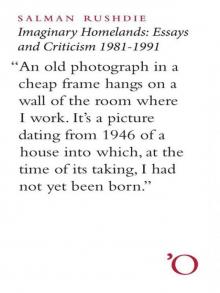 Imaginary Homelands: Essays and Criticism 1981-1991
Imaginary Homelands: Essays and Criticism 1981-1991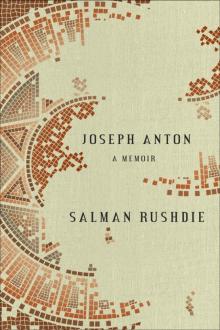 Joseph Anton: A Memoir
Joseph Anton: A Memoir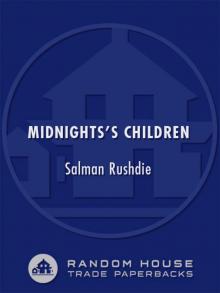 Midnight's Children
Midnight's Children East, West: Stories
East, West: Stories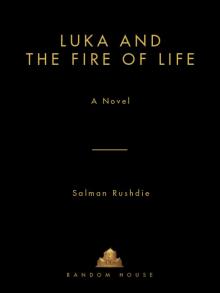 Luka and the Fire of Life
Luka and the Fire of Life Fury Fury Fury
Fury Fury Fury Haroun and the Sea of Stories
Haroun and the Sea of Stories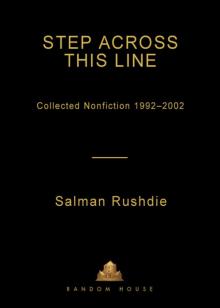 Step Across This Line: Collected Nonfiction 1992-2002
Step Across This Line: Collected Nonfiction 1992-2002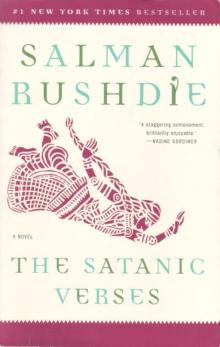 The Satanic Verses
The Satanic Verses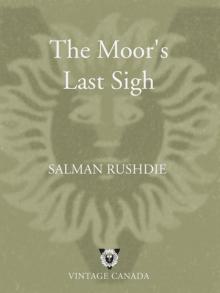 The Moor's Last Sigh
The Moor's Last Sigh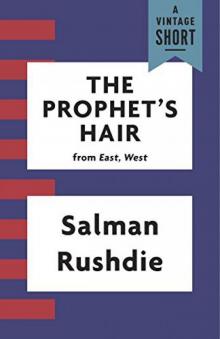 The Prophet's Hair
The Prophet's Hair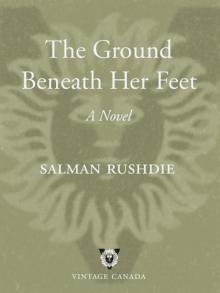 The Ground Beneath Her Feet
The Ground Beneath Her Feet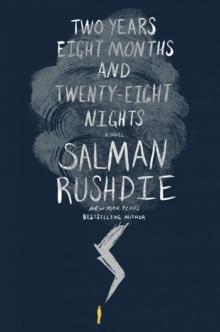 Two Years Eight Months and Twenty-Eight Nights
Two Years Eight Months and Twenty-Eight Nights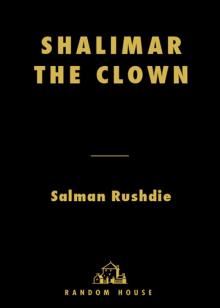 Shalimar the Clown
Shalimar the Clown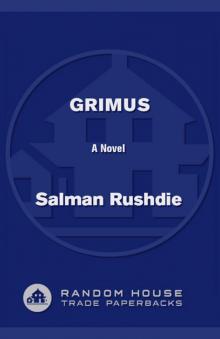 Grimus
Grimus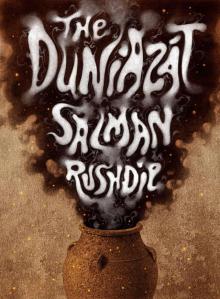 The Duniazát
The Duniazát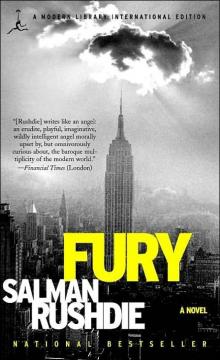 Fury
Fury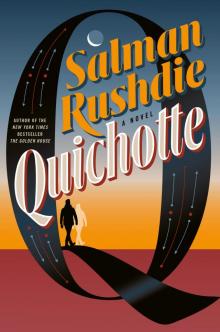 Quichotte
Quichotte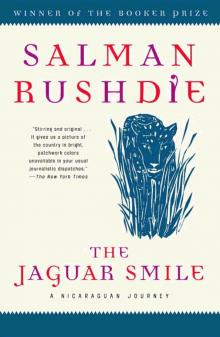 The Jaguar Smile
The Jaguar Smile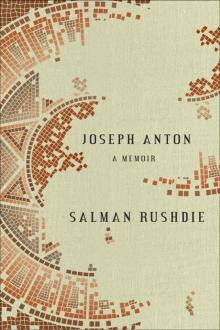 Joseph Anton
Joseph Anton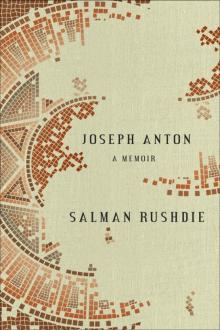 Joseph Anton: A Memoir: A Memoir
Joseph Anton: A Memoir: A Memoir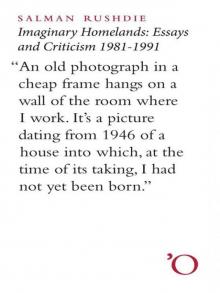 Imaginary Homelands
Imaginary Homelands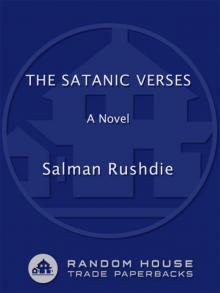 The Satanic Verses: A Novel
The Satanic Verses: A Novel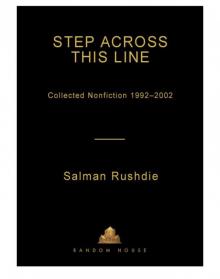 Step Across This Line
Step Across This Line East, West
East, West